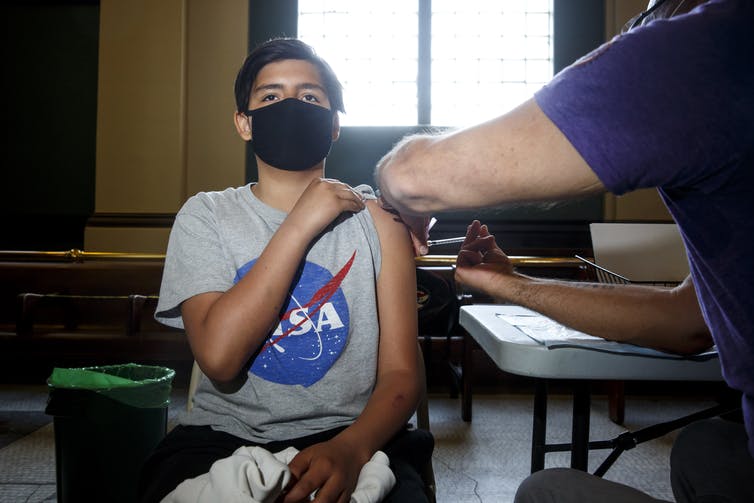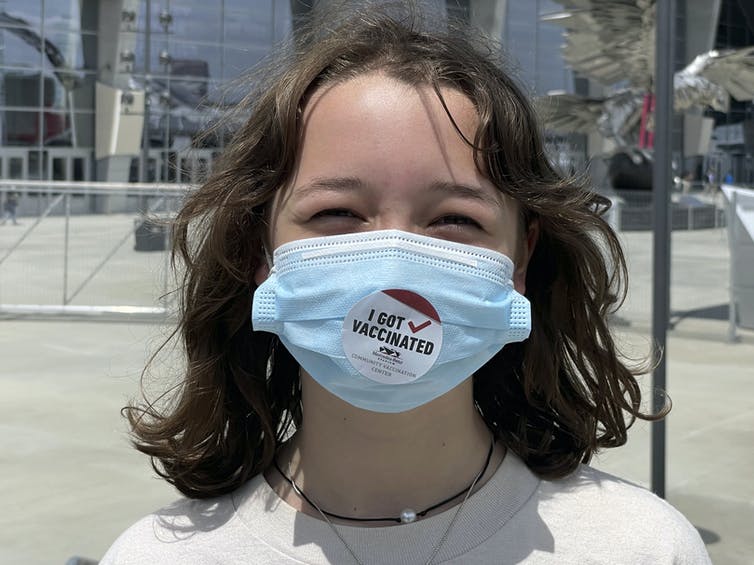
The U.S. Food and Drug Administration has approved Pfizer’s COVID-19 vaccine for use in children ages five to 11. Pfizer’s clinical trial results indicate the vaccine is safe and effective in this age group.
This is an important development. COVID-19 infections are on the rise in children across Canada.

Click here for more articles in our series about vaccine confidence.
It is now up to Health Canada to consider the data and to decide whether to authorize this COVID-19 vaccine for children. Once it is authorized in Canada, the National Advisory Committee on Immunization (NACI) will have to decide whether to recommend vaccination for all children in this age group.
This raises the question of how this decision ought to be made.
Table of Contents
Making an ethical decision
As a moral philosopher who has collaboratively researched ethical issues relating to the vaccination of children, I believe it is important to answer this question, for two reasons.
First, whatever the decision, the principles on which it is based — and should be based — must be clear and transparent.
Second, surprisingly little attention has been paid to this issue in Canada, despite the decision to vaccinate children being a matter of science and ethics. Science can clarify some of the costs and benefits of vaccination, but it cannot tell us which costs and benefits matter and when a cost-benefit ratio is favourable.
Fortunately, there is no need to generate a decision-making procedure from scratch. The procedure used by the United Kingdom’s Joint Committee on Vaccination and Immunisation (JCVI) in deciding whether to vaccinate healthy children aged 12-15 in the U.K. can provide important lessons about what not to do.
Risks and benefits
The most important factor is whether the benefits of vaccination outweigh its risks, and the degree to which the benefits outweigh the risks. In weighing these, the JCVI relied on what it called the “health perspective.”
Reasoning from this perspective, the JCVI held (in a series of public statements) that the chief benefits of vaccination against COVID-19 were the prevention of death, hospitalization, intensive care unit (ICU) admissions and pediatric inflammatory multisystem syndrome (PIMS) or multisystem inflammatory syndrome (MIS-C).
The chief harms of vaccination were myocarditis, or inflammation of the heart, and pericarditis, inflammation of the thin sack surrounding the heart, though it said these were rare and “typically self-limiting and resolved within a short time.”
The JCVI argued that the benefits of vaccination in this age group are only “marginally greater” than the harms and that therefore vaccination would not be offered to all members of this group.

THE CANADIAN PRESS/Winnipeg Free Press-Mike Deal
NACI disagreed, but did not outline the ethical principles it relied on in recommending vaccination for children ages 12-17.
JCVI’s decision not to offer all children vaccination against COVID-19 was flawed in numerous respects. (It was later overruled by the chief medical officers of the U.K.‘s four nations.) NACI will do well to avoid these mistakes in making its decision about vaccinating children ages five to 11.
The Independent Scientific Advisory Group for Emergencies (Independent SAGE, a group of British scientists offering independent scientific advice on the prevention of COVID-19) has raised a number of concerns about the JCVI’s decision-making process.
One concern is the way in which the JCVI calculated the benefits of vaccination, basing these calculations on risk to the population of all children of death, hospitalization, ICU admission and so on from COVID-19 infection, rather than the risks of these to children with a confirmed infection of COVID-19.
Another concern Independent SAGE raised was that the JCVI did not state which vaccine it considered when it examined the risks, a relevant concern since heart inflammation rates appear to be higher after the Moderna vaccine than after the Pfizer vaccine.
Direct and indirect benefits
Some of JVCI’s other mistakes related to value judgments, relying on the health perspective to make its decision. However, the JCVI was not consistent on what this included.
As noted, the JCVI mentioned the prevention of death, hospitalization, ICU admission and PIMS or MIS-C. These are not the only health benefits of vaccination against COVID-19. Some direct and indirect health benefits of vaccination were not clearly included.
The direct benefits include the prevention of long COVID — a condition affecting anywhere from two to 14 per cent of children infected with COVID-19 — and potential neurological and cognitive deficits caused by COVID-19 infection.

THE CANADIAN PRESS/Nathan Denette
Preventing the negative mental and physical health effects associated with school closures, limits on sporting and other such activities and physical distancing requirements are among the indirect benefits (though these were rightly noted by NACI in its recommendation to vaccinate adolescents). These health effects are important when deciding whether to vaccinate.
These are the known risks and benefits. However, the JCVI’s refusal to recommend vaccination to all children aged 12-15 was due to the uncertainties “regarding the magnitude of the potential harms” of vaccination, including myocarditis.
Although it gave considerable weight to unknown harms or uncertainties of vaccination, the JVCI did not consider potential unknown benefits of vaccination, or uncertainties about benefits. There was no reason to rule these out. Uncertainties about benefits seem to be of as much importance in thinking about the risk benefit profile of COVID-19 vaccination as uncertainties about risks. These, again, matter greatly to this decision.
The JCVI made another ethical error when it said the harms of vaccination should be given greater weight (relatively speaking) than the benefits.
There is no good reason to place a higher relative value on harms compared to benefits. Harms caused by vaccines are not worse than harms caused by COVID-19. It does not appear to be true that the rare and typically mild pericarditis or the myocarditis caused by vaccination is any worse than the pericarditis or the myocarditis caused (at greater frequency) by COVID-19 infection. This is not in line with other treatments considered for children, for which harms are not typically weighed more heavily than benefits.
The well-being perspective
It was a mistake for JCVI to make the decision about vaccination against COVID-19 in children purely on the basis of the health perspective. Health is important. But it is not the only value in the lives of children. Health is a priority because without it many other important benefits — enjoying friends, connecting with relatives, absorbing oneself in homework or music lessons — become much more difficult, if not impossible.

(AP Photo/Angie Wang)
The JCVI mentioned the beneficial effects of vaccination on education. But it did not factor these benefits into the decision relating to vaccinating children against COVID-19.
Educational and other benefits afforded to children by vaccination matter greatly and must be factored into this decision. Moving beyond the health perspective into the well-being perspective encompasses a larger range of benefits and protections from vaccination, including safe and stable learning environments, time with extended family, sport, music performances and the many other things that make life happy and meaningful for children.
When making the decision whether to vaccinate children aged five to 11 against COVID-19, regulators in Canada must rely on both sound science and sound ethics. They must in particular consider all the health and well-being impacts of vaccination more generally; they must consider the uncertain harms and benefits of vaccination; and they must treat benefits and harms symmetrically.
Doing so will show that vaccinating children is, all things considered, beneficial.
Do you have a question about COVID-19 vaccines? Email us at ca‑vaccination@theconversation.com and vaccine experts will answer questions in upcoming articles.
![]()
Anthony Skelton does not work for, consult, own shares in or receive funding from any company or organisation that would benefit from this article, and has disclosed no relevant affiliations beyond their academic appointment.























